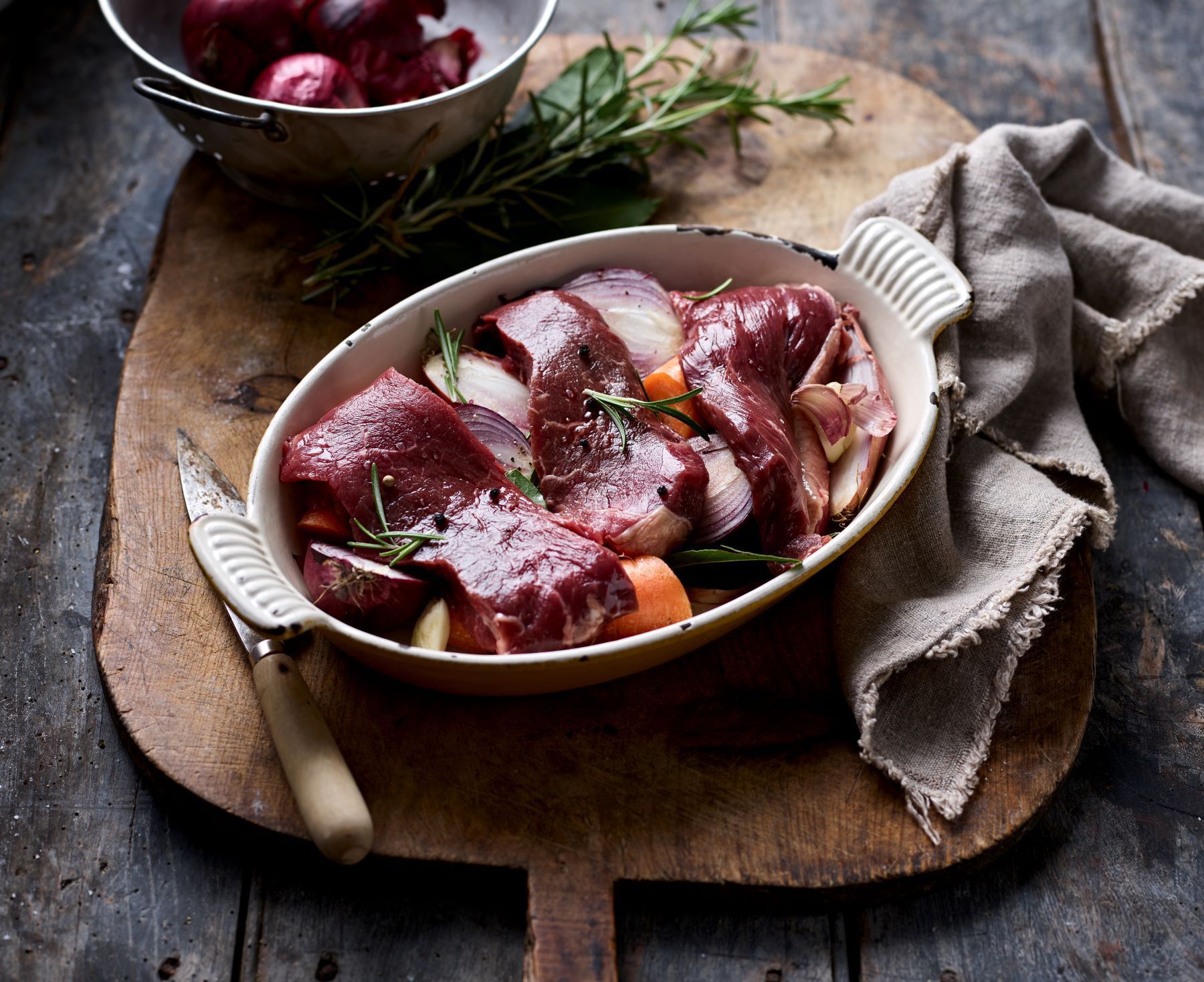It’s Great British Beef Week!
To kick off one of our favourite moments in the calendar, we are excited to announce a new partnership with Dr Lucy Williamson and Georgina Rees, Registered Nutritionists from The Gut Health Project.
They have been working on an exciting project for us, compiling the latest scientific research, nutrition reporting and health messaging on the benefits of eating grass-fed beef. We’ve always been fairly confident about the nutritional goodness of our delicious organic beef, and through this partnership we can share the latest science with you.
Is Grass-Fed Beef Nutritious?
As Organic Online Butchers, we champion our Grass-Fed Beef; not only for it's taste and quality, but it’s one of our best sources of high-quality protein and essential nutrients like iron, zinc and Vitamin B12 which are either absent or hard for us to absorb from plants. It’s fats also give us important fat-soluble vitamins including A & E.
In this article, we will go into more depth on the Macro and Micronutrients of grass-fed beef.......



Macronutrients in Grass-Fed Beef:
Fats - What are they and why do we need them?
• All food contains the two main types of fats – saturated (mainly animal) and unsaturated (mainly fish and plants).
• The fat content of a food is described according to the type it contains most of; meat for example contains slightly more saturated fat. Grass-fed beef usually contains less total fat than conventional beef because these cows are outside more and therefore more active, over the course of a year (this also means fewer calories)
• Fats are an important part of our diet. They contain soluble vitamins like A (great for immunity and healthy vision) and E (an important anti-ageing vitamin) as well as being a vital source of energy. They also contain essential fatty acids that we can’t make ourselves, but we need for all our cell membranes such that the functioning of the brain, nervous system, immune system and blood vessel lining depends on them.
• Omega 3 is a type of unsaturated essential fatty acid with an important anti-inflammatory role, specifically types DHA and EPA, known to be protective against heart disease and mainly available from marine food like fish. It’s important for our health that the ratio of our intake of Omega 6: Omega 3 is as near 3:1 as possible. It’s easier to get Omega 6 in our diet as it’s in higher in most plants than Omega 3. The main source of Omega 3 however is fish and currently in the UK no age groups eat enough fish (NDNS*). This means our actual Omega 6:3 ratio in general is nearer 10:1. The right balance of Omega 6:3 protects our heart health, reduces inflammation within our body, benefits our immune system and probably protects our mental function too – there is much ongoing research here. Additionally, Omega 3 from plants has to be converted by our body into the beneficial forms DHA and EPA first, before we can benefit from it. This provides far less DHA and EPA than we get from fish. (see below for grass fed beef) *NDNS = National Diet and Nutrition Survey, our annual UK survey on consumption rates of foods.
• Cholesterol – this is a type of fat that we need for making hormones, bile for our digestion and Vitamin D. High blood cholesterol is however associated with heart disease so in this case it’s good to eat foods which help to lower cholesterol. Foods low in saturated fat like plants and fish help to lower blood cholesterol. Grass fed organic beef is generally lower in saturated fat than conventional beef and therefore is a good meat choice, once weekly, to ensure you can still benefit from its valuable nutrients like high quality protein, iron and Vit B12. (For those with normal cholesterol levels, the food we eat actually makes little difference to our blood cholesterol).
Protein:
- Meat is a key source of protein, especially essential amino acids (protein building blocks), which cannot be synthesised in the human body .
- Red meat is rich in high-quality protein, including all eight essential amino acids required by adults and all nine amino acids required by children.
- There is a substantial difference in the proportion of calories as protein vs. fat between grass fed and conventional beef. Grass fed beef on average provides more than three quarters of its energy (calories) as protein (it is leaner) whereas grain fed beef provides less than half of its calories as protein (it contains more fat)
- This is important as protein provides the greatest satiety, or feeling of fullness, by the increased release of an intestinal hormone which regulates our appetite.
- As well as an important source of energy, protein is vital for growth and development, pregnancy and breast feeding and to maintain strength in older age.
Micronutrients in Grass-Fed Beef:
Beef provides a matrix of vital micronutrients which are very easy for our bodies to absorb. In plants these same nutrients are often in a form that is much harder for us to absorb. Within a plant-based diet (important to ensure that we all eat plenty fibre and other phytonutrients to protect our health and gut health) grass fed beef is a high-quality food that can provide maximum nutrition in a small portion size to avoid the potential nutrient gaps of plant-based eating.
Grass-fed beef is a valuable source of Vitamin A
- Grass fed beef has fat which is yellow in colour due to higher levels of carotene from the variety of grazing grass and herbs. Our bodies can convert this carotene into Vitamin A.
- Vitamin A is especially important for healthy vision and to support a strong immunity, especially for our airways and digestive system
Grass-fed beef is rich in Vitamin E
- Grass fed beef can contain up to 4 times more Vitamin E, a valuable anti-oxidant, than conventional beef - sometimes the same as an avocado!
- Vitamin E has a vital role repairing cell damage, protecting our health against the effects of ageing and chronic inflammation
As with all red meats, grass-fed beef is a valuable source of Iron, Vitamin B12 and Zinc
- Iron is required for every energy process in the body as well as brain development during pregnancy & early childhood years, to preventing anaemia and maintaining mental function. Extreme tiredness is common with deficiency and its requirements are far higher during puberty and pregnancy when there is a large increase in blood supply.
- Vitamin B12 is essential to prevent anaemia and for a healthy nervous system. It is only found naturally in animal sources - Dairy, Meat and Fish. It is not present in plants other than as a trace in fermented foods (also from microbes). Excellent sources of B12 are foods of ruminant origin due to their natural fermentation chambers (their very own gut health!), so dairy and meat products are an important source.
- Zinc is required for a healthy immune system, healthy skin and by almost every enzyme in our body. As our body doesn’t store Zinc, we need to eat enough every day to ensure we’re meeting our daily requirements. Zinc is hard to absorb from plants and so meat is a valuable source.
.jpg)



.jpg)

